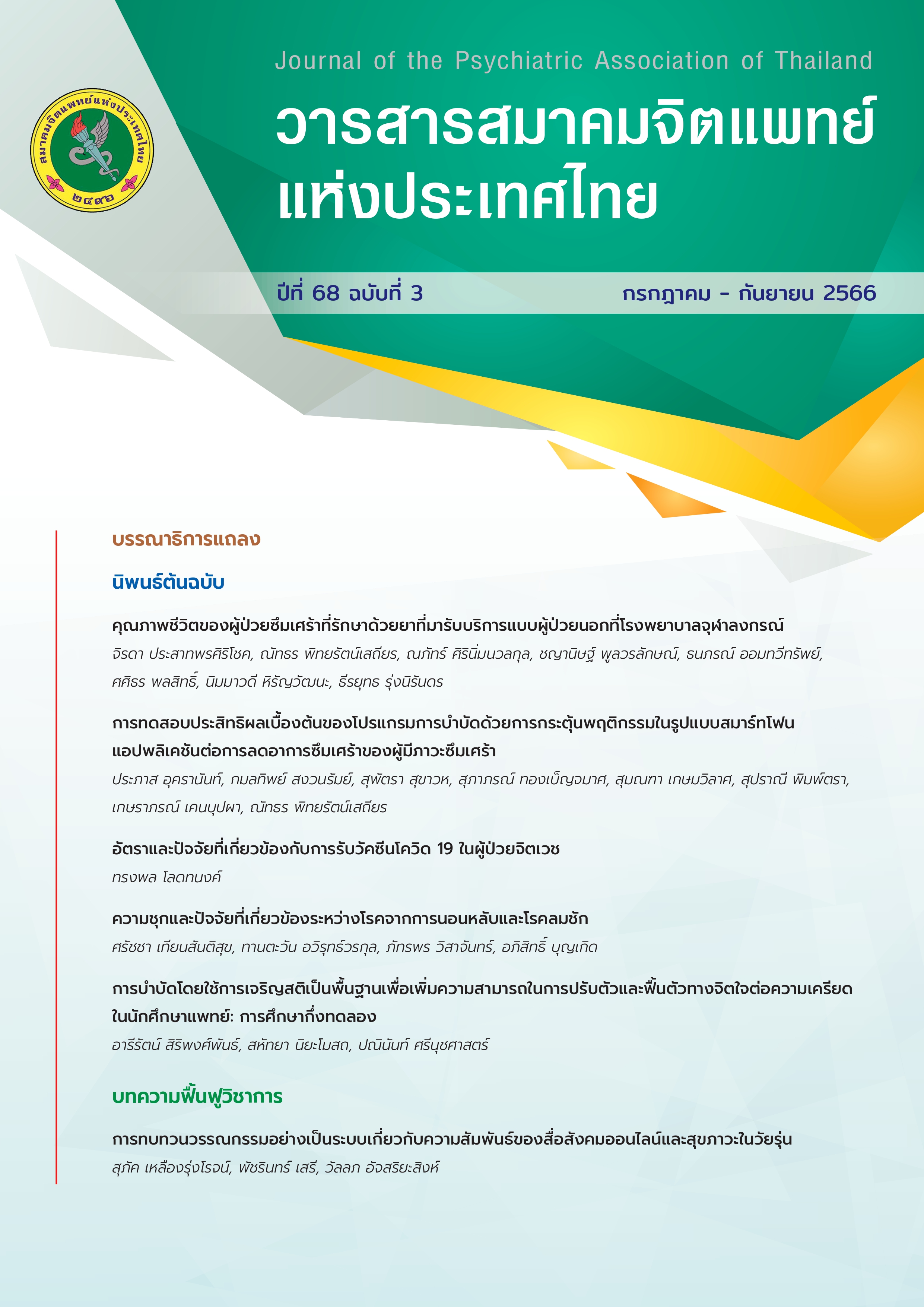Prevalence and Correlation Between Sleep Disorder and Epilepsy
Main Article Content
Abstract
Objective: Epilepsy is one of the most common neurological disease. Epilepsy and sleep have a bidirectional relationship. Epilepsy can cause sleep disorder in patients. Concurrently, poor sleep quality or sleep disorder may trigger epileptic seizure. Understanding this relationship can provide early intervention for better sleep and epilepsy control including screening and preventing possible following comorbidities.
Methods: A cross-sectional study was conducted at Ramathibodi Hospital, Bangkok, Thailand. A Total of 122 patients, diagnosed by a neurologist as those who had epilepsy, were recruited at the outpatient neurology clinic of the hospital. In this study, the demographic data of all patients was collected. All participants were evaluated for their sleep quality, using a Thai version of the Pittsburgh sleep quality index questionnaire. The prevalence of poor sleep quality was determined. The correlation between potential variables and the presence of sleep quality in patients with epilepsy was analyzed using t-test, chi-square and Fisher’s exact test.
Results: From our findings, the prevalence of poor sleep quality was 53.27%. Poor sleep quality was found to be statistical significance correlated with temporal lobe epilepsy (p<0.01) and age (p=0.01).
Conclusion: The prevalence of poor sleep quality among Thai patients with epilepsy was high especially in temporal lobe epilepsy and older patients. Awareness and Screening for sleep quality in patients with epilepsy could help physician provide early intervention for better sleep, control epilepsy and improve patients’ quality of life.
Article Details

This work is licensed under a Creative Commons Attribution-NonCommercial-NoDerivatives 4.0 International License.
Articles submitted for consideration must not have been previously published or accepted for publication in any other journal, and must not be under review by any other journal.
References
Roland D, Rainer S, Terence J, Josemir W. Epilepsy in adults. Lancet 2019; 393(10172): 689-701.
Mahinda Y, Marco M. Social cognition, psychiatric comorbidities and quality of life in adults with epilepsy. Epilepsy and Behavior 2019; 100(Pt B): 106321.
Sean L. Sleep and epilepsy: a complex interplay. The journal of Missouri State Medical Association 2017; 114(6): 453–57.
Madeleine G, Nancy F. Bidirectional relationships of sleep and epilepsy in adults with epilepsy. Epilepsy Behav 2021; 116: 107735.
Ahmer A, Shasha W, Naoum P, Sandra R, Vernon L, Peter W, et al. Association of sleep with sudden unexpected death in epilepsy. Epilepsy Behav 2017; 76: 1-6.
Bazil C. Epilepsy and sleep disturbance. Epilepsy Behav 2003; 4: 39–45.
Vignatelli L, Bisulli F, Naldi I, Ferioli S, Pittau F, Provini F, et al. Excessive daytime sleepiness and subjective sleep quality in patients with nocturnal frontal lobe epilepsy: a case-control study. Epilepsia 2006; 47: 73–77.
Rasintra J, Pluemkamon R, Piradee S. Sleep problems among children and adolescents with epilepsy in Thailand: single-center cross-sectional study. Sleep 2021; 44: A247.
Tullaya S, Sontuss B, Pimon R, Wattanachai C. Reliability and validity of the Thai Version of the Pittsburgh sleep quality index. J Med Assoc Thai 2014; 97 (Suppl. 3): S57-S67.
Vefa I, Ahmet U, F I. Subjective sleep disturbance in epilepsy patients at an outpatient clinic: a questionnaire-based study on prevalence. Epilepsy Research 2015; 115: 119-25.
Im H, Park S, Baek S, Chu M, Yang K, Kim W et al. Associations of impaired sleep quality, insomnia, and sleepiness with epilepsy: a questionnaire-based case-control study. Epilepsy and Behavior 2016; 57: 55-59.
Unterberger I, Gabelia D, Prieschl M, Chea K, Hofer M, Hogl B et al. Sleep disorders and circadian rhythm in epilepsy revisited: a prospective controlled study. Sleep Medicine 2015; 16: 237-242.
Bruno M, João C, António M. Effects of antiepileptic drugs on sleep architecture parameters in adults. Sleep Science 2022; 15(2): 224–244.
Scarlatelli L, Sukys C, Watanabe N, Guarnieri R, Walz R, Lin K. How do people with drug-resistant mesial temporal lobe epilepsy sleep? A clinical and video-EEG with EOG and submental EMG for sleep staging study. eNeurological Science 2016; 4: 34–41.
Nayak C, Sinha S, Nagappa M, Thennarasu K, Taly A. Effect of carbamazepine on the sleep microstructure of temporal lobe epilepsy patients: a cyclic alternating pattern-based study. Sleep Medicine 2016; 2: 80–85.
Yaranagula S, Asranna A, Nagappa M, Nayak C, Pratyusha P, Mundlamuri R. et al. Sleep profile and polysomnography in patients with drug-resistant temporal lobe epilepsy (TLE) due to hippocampal sclerosis (HS) and the effect of epilepsy surgery on sleep-a prospective cohort study. Sleep Medicine 2021; 80: 176–183.
Crespel A, Coubes P, Baldy-M. Sleep influence on seizures and epilepsy effects on sleep in partial frontal and temporal lobe epilepsies. Clinical Neurophysiology 2000; 111 S54–S59.
Yildiz F, Tezer F, Saygi S. Temporal lobe epilepsy is a predisposing factor for sleep apnea: a questionnaire study in video-EEG monitoring unit. Epilepsy Behav 2015; 48: 1–3.
Filho GM, Rosa VP, Lin K, Caboclo LO, Sakamoto AC, Yacubian EM. Psychiatric comorbidity in epilepsy: a study comparing patients with mesial temporal sclerosis and juvenile myoclonic epilepsy. Epilepsy Behav 2008 Jul;13(1):196-201.
Ertem D, Dirican A, Aydin A, Baybas S, Sözmen V, Ozturk M, et al. Exploring psychiatric comorbidities and their effects on quality of life in patients with temporal lobe epilepsy and juvenile myoclonic epilepsy. Psychiatry Clin Neurosci 2017; 71: 280–8.
Andrew G, Meredith S, Yue L, Rogier A, Cam C. How are age-related differences in sleep quality associated with health outcomes? An epidemiological investigation in a UK cohort of 2406 adults. BMJ Open 2017; 7(7): e014920.
Christian C, Mirjam M, Vera K, Katharina B, Anna W. Age-related changes in the circadian and homeostatic regulation of human sleep. Chronobiol Int 2006; 23(1-2): 461-74.


